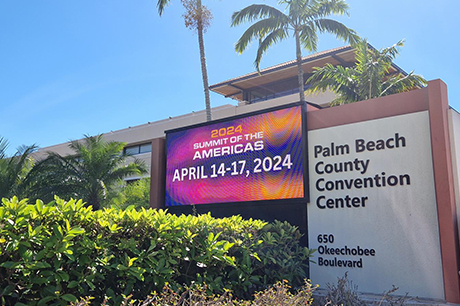AENA shapes up Spanish airports for private sector
By John Gallagher |
 Spanish airports operator AENA is due to join the Madrid Stock Exchange on February 11, amidst a minor spat that has broken out following the mega travel retail duty free tender won by the World Duty Free Group way back in 2011.
Spanish airports operator AENA is due to join the Madrid Stock Exchange on February 11, amidst a minor spat that has broken out following the mega travel retail duty free tender won by the World Duty Free Group way back in 2011.
The irony of course is that just as Aeropuertos Españoles y Navegación Aérea (AENA) dresses up for its partial flotation, it has become embroiled in a disagreement with the very company that helped make it all possible.
At the heart of this ‘disagreement’ is its lead concessionaire World Duty Free Group’s contention that its winning bids to run all of the retail operations in all Spanish airports were based on passenger estimates provided by AENA – but they have not gone to plan.
However, AENA reasons that the traffic figure estimates were only provided for the guidance of prospective bidders to carry out their own due diligence.
None of which is likely to spoil the party for Mariano Rajoy’s Popular Party Government at this stage however – especially considering that the partial privatization of the Spanish airports operator has presented it with quite a challenge already.
Rajoy’s economic team has ‘looked’ at selling a stake in the world’s biggest airport operator several times since coming to power in March 2011, but only now – after last November’s postponement – is the Madrid Stock Exchange within reach, ahead of the February flotation and with a final flotation price to be fixed two days prior to the flotation.

José Manuel Fernández Bosch, Director of Commercial Services and Property Management at AENA is the senior executive who put together the Spanish airports tender and he said last year: “It was very clear in the tender documents and in the contract that the projections were merely indicative and not-binding and that the bidders must prepare their own projections to put an offer at their own venture. All the bidders played the same cards and, from what I know, many of them, including WDFG, hired external support to prepare alternative projections.”
ECONOMIC CRISIS CAUSED DELAY
Indeed, had it not been for the severe economic crisis that has depressed passenger numbers throughout the Spanish airports network, this privatization would surely have taken place by now.
Now that passenger growth has been firmly reestablished at the leading airports in the 46-strong network, the timing looks about as right as it can be to attract this much needed private capital into AENA.
All ideological arguments aside, the Spanish Government did take its time to decide on the actual model to forward for approval to the Spanish Parliament. In fact, when airport privatization was first mooted several years ago, the previous socialist government seemed to favour sharing power with the autonomous regions that form Spain’s second layer of government.
But last year Rajoy and his team took the decision to retain a majority 51% stake, while agreeing to sell off a 49% share to a group of core shareholders and other institutional stakeholders – as well as offering some to private investors and employees via the Madrid Stock Exchange.
The government then decided to look for three core shareholders who would agree to stay onboard for at least a year and last October they approved the biggest.
Corporacion Financiera Alba is the investment fund controlled by the March family from the Balearic islands, who will have an 8% stake, while the Madrid-based Ferrovial infrastructure specialist and leading shareholder at London’s Heathrow Airport and the British based The Children’s Investment Fund were also selected as the other core investors – with 6.5% holdings.

The original decision to sell 49% of state operator, Aeropuertos Españoles y Navegación Aérea (AENA) was announced last June, with the aim of raising €2.2bn ($2.9bn). The Spanish Government’s Public Works Minister Ana Pastor (top right) argued that the presence of private investors will strengthen the management of AENA, so ensuring the future sustainability of the Spanish airports’ system network.
NO GUARANTEES WITH THIS FLOTATION
Following an investment road show at the end of January, Spanish government sources were convinced that the retail offer to private and institutional shareholders would be fully subscribed and the success of the flotation was almost guaranteed.
At that time they clarified that the February flotation price would be at the top end of the €43 to €55 ($49-$62) band that they originally indicated during the investment sell-in.
With the total enterprise value now looking to be north of €8,000m ($9,076m) it would now seem that institutional investors and small private investors will see their purchase orders scaled back.
With the flotation price at the higher end of government expectations, it is still unclear whether the core shareholders would take up their full allocation. Indeed, some market makers have expressed concern that Ferrovial, who had indicated when they made their commitment last year that they would take a 6.5% stake at a maximum price of €48.60 ($55.13 per share, may be having second thoughts.
Clearly the government is particularly keen that Ferrovial takes its full stake, as its experience of managing airports around the world is seen to be of immense value in this new stage of Aena’s development.
Ferrovial had also earlier declared an interest in increasing its holding, once core shareholders were permitted to buy more shares. If any of the core shareholders do not take up their full allocation, these shares can be redistributed to other institutional investors or be sold to small retail investors.
Of course, the share offer itself has attracted a great deal of interest and although the government struggled to place a correct value on the worth of the company, it now looks as though the sell-off will be a success.

The ‘Thinking Barcelona’ souvenir and local specialty product store concept.
TOUGH PERIOD FOR SPANISH INVESTORS
The company has struggled over the last three years, along with the Spanish economy and the deep recession as the country felt the effect of the worldwide economic crisis.
Thankfully, passenger traffic is now recovering and although it is still a long way from the peak figure of 203m in 2011, industry observers are forecasting further growth in 2015. Last year closed in positive territory with total traffic up 4.6% to 196.8m compared to the previous 12 months. Significantly, all the major airports showed increases.
Madrid reached 41.8m passengers – an increase of 5.3% – and Barcelona grew by 6.7% to 37.6m. At the same time, the mostly tourist airports at Palma de Mallorca 23.1m, Malaga 13.7m and Alicante 10.0m all showed growth.
Costs at AENA have also been reduced significantly over the last 18 months and with no major capital expenditure projects on the horizon, EBITDA will surely be positive over the next few years. EBITDA for the 2014 financial year was forecast at €1,848m ($2,096m, up from €1,610m ($1,825m) in 2013 and significantly higher than the €882m ($999m) back in 2011.
The airports manager has also managed to decrease its net debt over the last three years and has promised to continue to do so in the medium term. At the same time and in preparation for the flotation, the AENA Board has decided to allocate 50% of net profits to dividend payments, making investment in the airport operator an attractive proposition.
Even with the share price at the high end of the proposed price range, analysts have not been slow to remind the Spanish economic press that AENA’s shares look to offer better investment prospects than its direct rivals, such as Aéroports de Paris in France and Fraport in Germany.

Wines and spirits merchandising at Málaga Airport Terminal 3.
AERONAUTICAL REVENUES STABLE…
In spite of the fall in passenger traffic, AENA has managed to consolidate and increase revenues over the past three years. Aeronautical revenues have stayed fairly stable, although the company has promised boldly that there will be no increases over the next 10 years.
This will undoubtedly put its non-aeronautical revenue generating partners like WDFG, LSTR, Dufry and others under even more pressure in future, as well as its F&B and other service providers.
Not surprisingly, the AENA commercial team has been working hard to increase its non-aeronautical revenues and has successfully increased revenues from all activities such as car parking, on site car hire and its totally renovated food and beverages offer; these have all stayed buoyant during the recession.
The mega duty free and travel retail tender held in 2011 was also viewed as a great success, with World Duty Free Group, Dufry, Lagardere and Areas all competing for the three lots that were up for grabs.
Many industry observers had speculated that Swiss-based Dufry and French retailer Lagardère would bid aggressively to gain a major foothold in the Spanish airport sector, but expressed surprised when WDFG won all three tenders. Although it may have sounded like sour grapes, some competitors claimed that the incumbent operator had overpaid to guarantee its victory and events since would suggest that they might just have been right.
Of course, the fall in traffic figures has clearly caused more than a few headaches for the AENA management team, but the decline in passenger numbers across the airports network – and especially at the key airport of Madrid – even led the World Duty Free Group to threaten court action against the operator.

World Duty Free at Mallorca Airport in Spain.
THERE ARE NO SURE THINGS…
The travel retailer claims that its winning bids to run the travel retail operations in all of the Spanish airports were based on passenger estimates provided by the airport operator. It has also claimed that it should be allowed to renegotiate the rents and minimum annual guarantees based on those estimates, which are supposed to deliver results to their door.
But for its part, AENA is having none of this. It claims that the forward-looking passenger figures were for guidance only and prospective bidders should have been aware that is their own responsibility to carry out such due diligence.
Obviously, this has cast a shadow over the relative ongoing success of the privatization, since the travel retail segment provided the apparent ‘banker deal’ to underpin and ‘guarantee’ the commercial revenues at AENA.
To what extent this row over the commercial income will impact – if any – on the partial flotation remains to be seen, although there is obviously some uncertainty while any threat of legal action remains.
Obviously neither side is looking for a long running and expensive legal battle and right now industry analysts say they are hoping that both sides will sit down and try to reach a final agreement, once the stock market flotation is out of the way.
Meanwhile, Spain’s economic recovery continues to gain momentum with government figures indicating that the economy grew by 2% last year. This year looks like being another positive one as consumers take advantage of falling oil prices and lower personal taxes and the latest estimates indicate that GDP growth will reach 2.5% for the year, with most analysts predicting that activity throughout the AENA airports network will be strong.

Part of the beauty area at Barcelona Airport.
WANTED: FLOTATION FOLLOWED BY STABILITY…
This new upcoming phase in AENA’s development is likely to be overseen by its current President and CEO Jose Manuel Vargas. Last year, market analysts suggested that he might opt to leave after the flotation, but the increase in the enterprise value and the likely success of the share placement seems to have persuaded him to change his mind.
This is being seen positively in financial circles, since Vargas and his senior management team are well considered by followers of the Madrid Stock Exchange who are ever looking for stability for new private capital ventures as these enterprises strive to deliver enhanced shareholder value in both the short and medium terms.
[With additional reporting from Doug Newhouse].
Alcohol insights: Conversion up, spend down in Q4
Conversion of visitors in the alcohol category in duty free has risen to 54% in Q4 2023,...
Heinemann Asia Pacific makes breakthrough in New Zealand at AKL
Heinemann Asia Pacific is set to enter the New Zealand market with three new retail concepts at...
Men buy and spend more in travel retail says new research by m1nd-set
Men have a higher conversion rate and spend more when shopping in travel retail, says new...
-
 International,
International,Alcohol insights: Conversion up, spend down in Q4
-

-


In the Magazine
TRBusiness Magazine is free to access. Read the latest issue now.

 Trbusiness. The travel retail Trbusiness. The magazine for global retail and duty free professionals.
Trbusiness. The travel retail Trbusiness. The magazine for global retail and duty free professionals.





















